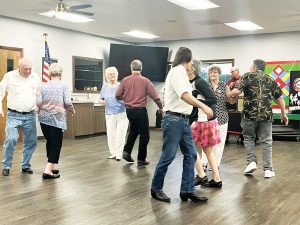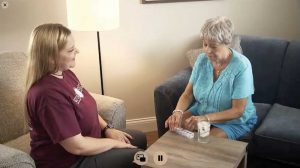Submitted by Sugar Creek Alzheimer’s Special Care Center
While changes can sometimes be confusing and worrisome, making the move to senior living doesn’t have to be. In fact, this transition and change can be a positive, enriching, and joyful experience for seniors and their loved ones, when they find the community that is right for them.
In order to provide insights into the process and the experience of making this transition during a global pandemic, our Administrators and Community Resource Directors at JEA Senior Living have shared some Frequently Asked Questions, along with their recommendations and resources for families:
“How do I know if the time is right for my loved one to move into senior living?”
Talk with your family physician to determine if the time is right for your loved one to move into a senior living community. After a healthcare assessment, your physician may recommend exploring senior living options based on your loved one’s overall physical health and mental wellbeing.
While some may require minimal support with Activities of Daily Living (ADLs), others may need more in-depth assistive services and potentially even memory care support in a specialized facility with highly trained staff.
Depending on the availability, type of care required, and admission process, it is always best to take next steps as soon as possible, and ideally, before care is needed. An ounce of prevention—or preparedness—is worth a pound of cure.
“Is my loved one safer at home with a family caregiver?”
What about COVID-19?”
While it may be appropriate in some cases for a senior loved one to receive care from a family caregiver, there are some things to keep in mind:
- What assistance does the senior loved one require, and is the family caregiver trained/experienced/licensed to provide this care safely and effectively?
– Depending on whether the individual needs assistance with tasks like organizing and grocery shopping, vs. ADL assistance and even medical tasks, is a good way to evaluate who is most equipped to support them.
- Does the family caregiver have enough time—and the ability to balance both their needs and their loved ones?
– For those in the sandwich generation (who have aging parents, and also children of their own) it can be difficult to find enough hours in the day to care for both your children and your aging loved ones. Being a caregiver and finding balance can be stressful. Consider your own mental health when evaluating who is the best care provider.
In terms of COVID-19, our communities are practicing enhanced infection prevention policies and procedures in order to protect both residents and our team members.
“If my loved one moves into a community, when will I be able to see them in person again?”
With frequently changing Federal and State guidelines, there are no guarantees about in-person visitation restrictions easing up anytime soon. However, it is our hope that as the COVID-19 vaccine becomes widely available and cases and transmission rates begin to drop, that we can eradicate this virus and get life back to normal.
If you are considering a senior living community, reach out to them and inquire about their current visitation policies. Even if in-person visits are not available, there may be other options that allow for meaningful connection and conversation with your loved one.
Our community programming teams have developed many creative ways for families to connect with their loved ones:
- Video Chats on Facetime, Zoom, Duo, and Skype
- Phone Calls, Voice Messages, and Texts
- Letters and Postcards with Photos
- Window Visits using EverSound Headsets
- And more!
“What about finances? How much does it really cost for senior living?”
Senior Living communities are more affordable than you might think. With package pricing and one monthly fee, a senior living community can be more affordable than living independently.
When it comes down to finances, there are several things to consider:
- Will assets cover care for the long-term, or will alternate funding be required?
- Is your loved one eligible for Veterans Assistance benefits?
- Does your loved one or their spouse hold a long-term care insurance policy?
- What are the average monthly expenses for your loved one living independently? How do these costs compare to a senior living community?
As you calculate costs and start exploring options for senior living, ensure that you have a trusted advisor and resource. Our teams at JEA Senior Living are happy to answer questions and provide a no-cost evaluation of finances, in order to help you and your loved one find the right senior living community.
“How do I evaluate communities, if I cannot physically tour them? What other criteria should I look at, or ask about?”
Although COVID-19 restrictions prevent on-site tours of senior living communities, there are many digital and virtual solutions to help you compare options. With virtual tours and walkthroughs, you can tour the community virtually at your own pace, and even connect with community team members to ask questions and get a second look.
Make sure that you request a floor plan of the apartment options and community footprint. These tools are both helpful when determining which layout options will be best for your loved one. Would an apartment near the dining room be better? Or maybe a room with a great view? Understanding the location of the apartment, and its layout are also great when planning the move-in and how much furniture will fit.
Other criteria to look for and inquire about can include:
- Annual State Survey Reports
- Citations and Complaints
- Awards and Recognitions
- Management Company History and Track Record of Success
All of these factors will help you make the most informed decision for your loved one and their future home.
“My loved one has been diagnosed with early-onset dementia, should they be placed in a memory care community, or an assisted living?”
This question comes down to the recommendations of your family physician. Memory care may be appropriate in some cases depending on the specific diagnosis and the disease progression. Programming, ADLs, dining, and other care needs should be considered to ensure that they are appropriate for the individual and will meet both their care and engagement needs.
Kristyn Durre is the Community Resource Director at Sugar Creek Alzheimer’s Special Care Center located at 505 East Vernon Avenue in Normal. Learn how Sugar Creek is the leader in memory care services in central Illinois. Check us out by visiting our website at www.sugarcreekalz.com or check us out on Facebook. Our phone number is 309-451-3000.
For additional informative and inspirational articles visit 50 Plus News and Views Bloomington Normal Issue online today.










